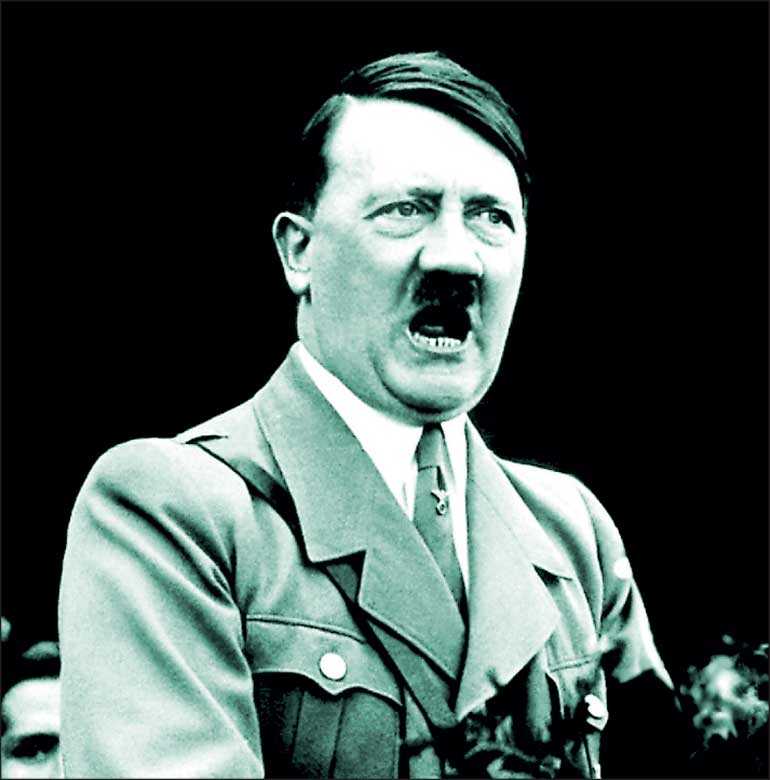Friday Feb 13, 2026
Friday Feb 13, 2026
Saturday, 17 April 2021 00:00 - - {{hitsCtrl.values.hits}}

It seems that, in the public psyche of this land like no other, Hitler is perceived as a magically mysterious super-efficient good shepherd. One can understand the anguish of the German envoy. Hitler added ‘genocide’ to the lexicon and redefined the word ‘holocaust’
“History teaches. But it has no pupils.” – Antonio Gramsci –
 Herr Hitler is back in the news. At a press briefing, in response to a journalist’s query, a Minister of State has suggested that the people expect decisive governance as that of a “Hitler”.
Herr Hitler is back in the news. At a press briefing, in response to a journalist’s query, a Minister of State has suggested that the people expect decisive governance as that of a “Hitler”.
It seems that, in the public psyche of this land like no other, Herr Hitler is perceived as a magically mysterious super-efficient good shepherd.
Not surprisingly, the German envoy in Colombo has responded. “Adolf Hitler, responsible for human suffering and despair beyond imagination is no role model for any politician.”
The German Ambassador speaks with the advantage of hindsight. Retrospective wisdom has its inconveniences. He is not particularly fond of the Austrian born corporal who became Commander in Chief of the fatherland. Of course, he has good reasons.
Germany produced Emanuel Kant, the philosopher who bequeathed humanity the great philosophical tract ‘Critique of Pure Reason’. (As a youth who just turned 20, this writer recalls a visit to Konigsberg his birthplace then in East Germany.)
Germany also produced the German Jew Karl Marx, who challenged the morality of regarding gold as the Holy Grail.
Germany produced Max Weber who defined the protestant ethic in public administration.
In the 21st century, Germans naturally prefer to depict their efficiency through the brands of Mercedes Benz, BMW and Porsche.
As Angela Merkel’s favourite philosopher Karl Popper insisted: “The future is wide open and depends on us, on all of us.”
But then, despite there being no pupils, history remains a stubborn teacher.
It is this same German nation that also produced Adolf Hitler. One can understand the anguish of the German envoy. This chap Hitler added ‘genocide’ to the lexicon and redefined the word ‘holocaust’. Let us not forget. Hitler was human. Evil too is a capacity in human nature.
Niceties and naïvetés should not blind us to demonstrable truths. Hitler appealed to the embedded chauvinism of the Prussian conservative mind. He was a symptom of the corrosive extreme right-wing nationalism of a people who were willing to marginalise historically significant minorities who contributed to the ideas that made Germany the outstanding nursery of western enlightenment.
Hitler did not singlehandedly dismantle the dazzling edifice of German Jewish traditions of Western philosophy. He had plenty of learned collaborators.
When Hitler marched into Poland and Paris, there were wild cheers in Berlin. Let us not forget that Hitler had a substantial mass base among German-speaking peoples.
There is no doubt that at the peak of his power, he was loved by millions of people. Despite the serious reservations expressed by the German envoy, the fact that Hitler had millions of people clamouring for his leadership needs careful study.
That makes Hitler’s history relevant to us today, here and now. Hitler wrote an autobiographical manifesto ‘Mein Kampf’. In it he claimed that he was driven forward by a deep sense of personal destiny which he called providence.
Hitler told the German people, that they were Aryans and therefore by reasons of history and heritage they were ‘special’ and ‘better’.
After the humiliating defeat in the First World War the Germans were intrinsically predisposed to believe that they were indeed a superior but a wronged people who deserved better. The people found a connection with him. Hitler did not do it all by himself. He did not hypnotise the German nation. The Germans were ready to be hypnotised.
They were starving amidst unemployment and hyperinflation. The historian Lawrence Rees put it beautifully: “In an economic crisis millions of people suddenly decided to turn to an unconventional leader they thought had ‘charisma’ because he connected with their fears, hopes and latent desire to blame others for their predicament. And the end result was disastrous for tens of millions of people.”
Hitler’s madness had meticulous method. He visualised himself as the great ‘philosopher-leader’ in the mould of a Marcus Aurelius.
Astonishingly, he earned the active and open support of many intellectuals of his time.
The Cambridge scholar Yvonne Sherratt in her remarkable study ‘Hitler’s Philosophers’ details how learned men with impeccable academic credentials were driven by personal ambition to systematically vulgarise and distort the works of German philosophers Kant and Nietzsche and even Charles Darwin.
Fleeing intellectuals such as Walter Benjamin and Karl Huber were hunted down and murdered. Eminent minds such as Martin Heidegger and Carl Schmitt gleefully sanctioned and applauded Hitler’s raw acts of slaughter.
When we explore the person and ideas of Hitler, we must remember one solid stark truth. It is a difficult truth; it is a terrible truth. But it must be comprehended.
Hitler was loved by many Germans. As the historian Gilbert Allardyce points out, Herr Hitler’s regime was the most popular government when in midstream with Paris occupied and Brits paddling to safety in Dunkirk.
Millions of Germans were loyal to the regime while a very substantial swathe of public opinion pledged allegiance to the Nazi party.
It was an unparalleled collective delusion of a great nation. This collective delusion held Hitler at the helm until he ended it all in the dark dingy bunker in Berlin.
There were dissenting voices, those voices were far away, across oceans in distant lands.
Peter Viereck, the American poet of German descent, wrote presciently in 1940 when the Nazis were holding the world hostage: “Someday the same Germans now cheering Hitler’s strut into Paris will claim ‘We did not know what went on, we did not know’. When that day of knowing comes, there will be laughter in hell.”
Let us return to the subject proper – the idea of Hitlerian governance. It is the ruthless authoritarian centralised rule by decree. It is rule by the führer assisted and enforced by a select elite.
Hitler held out a dream and a promise. The dream of a great nation. The promise of prosperity. The struggle was the immediate price and many Germans thought they could afford the price.
In her monumental work ‘Origins of totalitarianism’ Hannah Arndt makes three pronouncements that should help the reader to link up the idea of Hitler with contemporary events that are unfolding here and now.
This is how a Hitlerian autocrat would explain the inexplicable. You avoid inconvenient discussions.
“There is hardly a better way to avoid discussion than by releasing an argument from the control of the present and by saying that only the future will reveal its merits.”
How do you convince, coerce and co-opt the people? You invite them for a chat.
“True goal of totalitarian propaganda is not persuasion, but organisation of the polity. ... What convinces masses are not facts, and not even invented facts, but only the consistency of the system of which they are presumably part.”
Who formed the core group of loyalists, apparatchiks and the pretorian guard of the regime?
“Totalitarianism in power invariably replaces all first-rate talents, regardless of their sympathies, with those crackpots and fools whose lack of intelligence and creativity is still the best guarantee of their loyalty.”
Dismissing Hitler as freakish manifestation of evil is absolute folly.
The first two decades of the 21st century has enough examples of credible Hitlerian hijacks of messy democracies where a rudderless rural peasantry links up with a desultory urban middleclass to seek order, stability and deliverance from a corrupt political class.
To the Liberal Democratic mind Hitler is the arch icon of evil. Where liberal democracy is in decline, and ultra-nationalism is on the rise Hitler represents disciplined development.
Hitler is not the first populist. He is also not the last. All indications are that at least in this little island Hitler seems to be the father of ‘populism’.
A personal note:
Just before the last Parliamentary Elections in August 2020 I wrote an essay which was titled ‘Why a super majority is a bad idea’. As it turned out, 69 lakhs thought it was an excellent idea. Since then I have avoided airing my thoughts, hopes and prayers.
I was overwhelmed by an inexplicable helplessness. I didn’t wish to edit my inner soul. Yet I don’t dare to air my heretical beliefs in a liberal democracy or my passionate belief in a civic nationalism. I feel stifled by a soulless state that has little patience with my hopes and dreams.
It really doesn’t matter. The sun is setting. The shadow lengthens. I am nearing the end of a decade past the biblical span of three scores and ten. So, after a long spell, I undertook this essay. Bottling up ideas that wish to burst out was too much for a mind with even the semblance of a conscience.